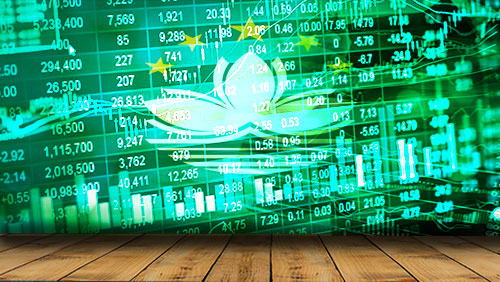Macau’s Gaming Inspection and Coordination Bureau (DICJ) director Paulo Martins Chan answers questions on the latest regulatory updates at the recently held Global Gaming Expo Asia 2017.
Macau’s economy grew at a faster pace in the first three quarters of 2017 on the back of solid gaming and tourism growth and a lower comparative base.
Data from Macau’s Statistics and Census Service released Monday show that Macau’s gross domestic product accelerated 10.3 percent to MOP93.58 billion (US$11.70 billion) in the January to March 31 period as exports and gaming services rebounded from last year’s contraction.
Increased visitors and higher visitor spending pushed the growth rate of Macau’s total exports of services to 13.4% in the first quarter of 2017 from 8.2% in the previous quarter. Exports of other tourism services also went up by 20.9 percent while imports of services rose by 6.9 percent.
 With the year-on-year increases in private consumption, investment and visitors’ spending, exports and imports of goods rose by 9.7% and 5.2% respectively year-on-year after five consecutive quarters of decline.
With the year-on-year increases in private consumption, investment and visitors’ spending, exports and imports of goods rose by 9.7% and 5.2% respectively year-on-year after five consecutive quarters of decline.
The statistics office also noted that Macau investment continues to improve.
Gross fixed capital formation, the gauge of investment, is up by 4.6 percent year-on-year, higher than the 0.2 percent growth in the last quarter.
Slower construction investment tempered Macau’s private investment growth to 1 percent. It was a different story on the government investment side as public construction and equipment investment jumped by 73.9% and 132.6% respectively year-on-year, leading to 75.3% growth in government investment.
Since 2014, Macau’s gambling industry has seen its revenue plummet from $44 billion to $28 billion last year as a result of the industry’s dependence on VIP consumers. These high-rollers have been a target of Beijing’s corruption crackdown.
To stop the financial bleeding, Macau’s government set a goal of increasing non-gambling development by 9 percent by 2020 and looks to eventually surpass Las Vegas’ mass market tourism attractions.
Macau’s Gaming Inspection and Coordination Bureau (DICJ) director Paulo Martins Chan told reporters in the recent Global Gaming Expo that the government has become more cautious in terms of approving licenses for junket operators.
The Chinese territory has seen the number of its licensed VIP gaming promoters drop from 141 last year to 126 in January 2017.
Macau authorities previously attributed the year-on-year decline to some junket operators failing to meet the DICJ’s tighter standards for financial accounting, which were imposed following a series of high-profile internal theft incidents that shattered junket investor confidence.
“I think we are in a good balance today. The junket number is actually around 120. Which is a very balanced number,” Chan said. “As you can see that in the proportion of revenues the junket is occupying less 53 percent. Whereas the mass market is 47 more or less. We think that this is a good proportion. We want to keep going with this.”